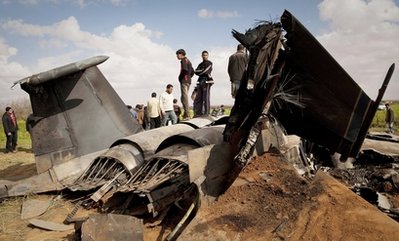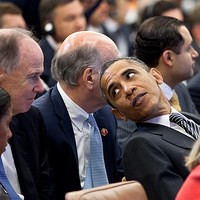![]()
Tue, March 22, 2011 | The Rubin Report | By Barry Rubin

Libyans stand on the wreckage of a US F15 fighter jet after it crashed in an open field in the village of Bu Mariem, east of Benghazi, eastern Libya, Tuesday, March 22, 2011, with both crew ejecting safely. The U.S. Africa Command said both crew members were safe after what was believed to be a mechanical failure of the Air Force F-15. The aircraft, based out of Royal Air Force Lakenheath, England, was flying out of Italy's Aviano Air Base in support of Operation Odyssey Dawn. (AP Photo/Anja Niedringhaus)
The War in Libya: Unprecedented Strangeness
Should the United States and Europe want Libyan dictator Muammar Qadhafi out of power? Sure. But the real question is how U.S. policy is dealing with this crisis.
1. Nothing could be more obvious than the fact that all of these people talking about how evil Qadhafi is are doings only because he is being so severely challenged in a civil war. Where were all of these humanitarians when nobody was writing about his repression? Better late than never but let’s get real about what has happened here.
2. How can a president go to war without even seeking a congressional resolution? Talk about an imperial presidency! Some in the media are so ridiculously eager to support Obama that one CNN reporter defended him by saying that he had telephoned some members of Congress!
But, for example, both George Bush presidents went to Congress before taking action in Iraq. What is the legislative body governing the United States, the Senate and House of Representatives or the UN General Assembly and Security Council?
3. What is the aim of the war? Overthrowing Qadhafi? Forcing a ceasefire? Protecting civilians? I’ve never before seen anarchy on the side of a U.S.-led (or is it a French-led?) coalition. From minute to minute the strategy seems to change.
4. Who is the opposition that the West fights to help? Islamists? Tribalists? Regionalists? Moderate democrats? Before you help someone win a war it helps to know who they are.
5. How can people who spent years criticizing the war in Iraq, telling us that war is no solution, decrying civilian casualties from other countries’ defensive activities, arguing that such interventions led to getting bogged down, apologizing for past interventions, insisting that there must be an “exit strategy,” and claiming that interventions in the Third World made the United States hated as an imperialist bully now plunge the United States into a third simultaneous war in a Muslim-majority country?
6. This war was entered into on the premise that the “Arabs” support it. But now the Arab League says it only supports a no-fly war and civilian protection, not an effort to defeat and overthrow Qadafi. This poses the broader question: Has anyone in the U.S. government considered the regional implications? One might note that the Arab nationalists oppose the intervention while the Islamists support it. That’s not a good indication.
7. Just calling something a humanitarian intervention does not solve all of the problems involved. The U.S. intervention in Somalia — the perfect example of a disaster in this regard — was also humanitarian in motivation.
8. At this point, at least, few are noticing a very interesting point about the Libya affair. Frightened by the U.S.-led invasion of Iraq in 2003, Qadhafi abandoned his nuclear weapons’ program and went out of his way to cooperate with the United States on this issue, fearing a similar invasion. Giving up a nuclear defense he still got invaded. How does this look to Iran’s regime? See, the rulers can now say, if we don’t have nuclear weapons there’s nothing to protect us from the West!
I have argued that Iran has sought nuclear weapons as a “defensive umbrella for aggression.” In other words, as Pakistan and North Korea have shown, if you have nuclear weapons you can do pretty much what you want (attack neighbors, sponsor terrorism against them) and nobody will touch you. Qadhafi’s case has now proven this to be the “best” strategy.
9. In terms of timing, the U.S. government waited until the last moment — reportedly in the fact of Obama’s indecision — and then rushed into a war without proper thought, planning, and definition of the mission there.
10. Instead of promoting unity among Western allies, Obama’s abdication of American leadership and general ineptness has promoted conflict. For the first time, NATO allies are openly bickering. Nobody is in charge, there’s no agreed plan, different countries are acting in conflicting ways. Le Nouvel Observateur, a magazine supporting the French left, described the operation as “a boat without a captain.” This is no accident since Obana thinks that the world is better off without having America take the lead.
So this Libya operation has lots of problems, many or most of which could have been avoided by a competent American leadership. At least the Iraq war was a huge success at the start and only later became something of a mess. This war is a mess from the start.
I am not saying that I necessarily oppose military intervention in Libya in principle. My view is that, first, there should have been a serious investigation of the Libyan opposition — this condition has not been met — and if it seemed worth supporting it should be sent arms and equipment.
Instead, we are getting a confused, ill-defined, and seemingly open-ended operation. The real issue is not whether something should be done but how it’s being done. As for what the goal is, who knows?



 RSS
RSS










The War in #Libya: Unprecedented Strangeness | #NATO #Gaddafi #France #UK http://j.mp/hDUMgS
RT @CrethiPlethi: The War in #Libya: Unprecedented Strangeness | #NATO #Gaddafi #France #UK http://j.mp/hDUMgS